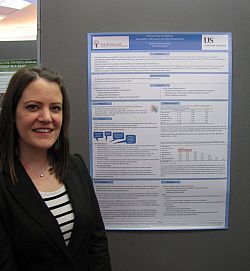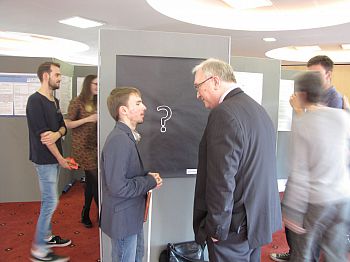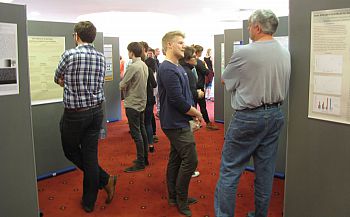From online dating to Alzheimer’s: Sussex students show off their research projects
Sussex undergraduates displayed their research on subjects as varied as Renaissance cookbooks, online dating and Alzheimer's disease at a poster exhibition on campus last Friday (2 October).
 Alexandra Earl was awarded first prize for her project, which examined the extent to which fathers treat their children as individuals with their own personalities.
Alexandra Earl was awarded first prize for her project, which examined the extent to which fathers treat their children as individuals with their own personalities.
 Daniel Hajas (left) won second place for his work on new technology for blind physics and maths students. Here Daniel explains his poster to Professor Michael Davies, Pro-Vice-Chancellor (Research).
Daniel Hajas (left) won second place for his work on new technology for blind physics and maths students. Here Daniel explains his poster to Professor Michael Davies, Pro-Vice-Chancellor (Research).
 The JRA/SURA poster exhibition gave undergraduates from all areas of the University a chance to show off the research they had been involved in over the summer vacation.
The JRA/SURA poster exhibition gave undergraduates from all areas of the University a chance to show off the research they had been involved in over the summer vacation.
Around 50 undergraduates took part in this year’s JRA and SURA schemes, and several were awarded prizes at last week’s exhibition in recognition of their hard work and achievement.
The exhibition brought together students from across Sussex who had been engaged in research over their summer vacation as part of the Junior Research Associate (JRA) and the Sussex University Research Associate (SURA) schemes.
The two schemes provide talented and ambitious undergraduates with a £2,000 bursary, allowing them to participate in original research with academic staff and other members of the University community.
The JRA scheme is open to all undergraduates at Sussex, while the SURA scheme is open to students involved in the University’s First‑Generation Scholars scheme, which provides support for those who come from relatively low‑income backgrounds.
Out of the JRA students, Alexandra Earl, a third-year Psychology with Cognitive Science student, was awarded first prize and received a £50 Amazon voucher for her project, which examined the extent to which fathers treat their children as individuals with their own personalities.
Alex said: “Working on the project has been awesome. I’ve received so much support from faculty and from other students.
“I’ve found my work over the summer very enjoyable, as I’m passionate about the role of dads in children’s development, and interested in discovering why children do well and why they might not do so well.”
Daniel Hajas, a third year Theoretical Physics student, won second place and a £30 Amazon voucher for his work on new technology that could help blind physics and maths students engage with charts and graphs.
Daniel, who is himself visually impaired, highlighted the challenges faced by blind students by exhibiting a completely blank poster, explaining that this was how a blind person would experience a complex equation.
Rosie Gilbertson, in her third year of an Art History degree, came in third place and was awarded a £20 Amazon voucher for her research into the links between the novelist Henry James and the Surrealist movement.
Out of the SURA students, Keiran Campbell-Johnston, a third year on a History degree, won first prize and a £50 Amazon voucher for his project on destitute mothers and the London Foundling Hospital at the turn of the 20th century.
Keiran said: “Working on this project over summer has really improved my research skills, which is making my transition into my third year at Sussex a lot easier.”
Tom Bonam, a third year Computer Science student, was the runner-up for the SURA scheme and won a £30 Amazon voucher for his work on an online teaching tool to help students understand aspects of machine learning.
JRA and SURA scheme entrants were judged on their framing of a research project, what they had achieved with their research, and the standard of their poster presentation.
Professor Michael Davies, Pro-Vice-Chancellor (Research), who gave out the prizes at the exhibition, said: “I’ve been majorly impressed by everything I’ve seen at the poster exhibition.
“There have been some great posters, and it’s also excellent to see projects from across the range of disciplines that we have at the University, with far more in the social sciences and humanities than we’ve had in the past.”
Pictured above are some of the students who were involved in this year's JRA and SURA schemes.

